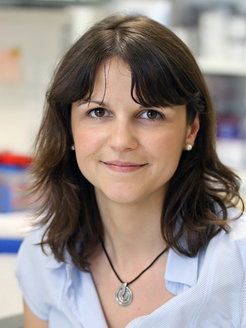ERC Grant for Nina Cabezas-Wallscheid
MPI-IE group leader Nina Cabezas-Wallscheid receives an ERC Starting Grant to investigate hematopoietic stem cell dormancy

Every minute, millions of blood cells die and need to be replaced. This is mediated by our blood-forming system in the bone marrow through a process termed hematopoiesis. Key protagonists of this process are hematopoietic stem cells (HSCs). Under physiological and healthy conditions, the most potent HSCs are retained in a state of dormancy, which is defined by a non-cycling resting state with a low energy demand. However, under conditions of stress, such as inflammation, blood loss or chemotherapy, these cells become activated and are pushed to produce new blood cells.
“The state of dormancy is very important for HSCs. It is a safety system for the cells in order to maintain genomic integrity and prevent the accumulation of gene mutations that are the cause for leukemia development” explains Nina Cabezas-Wallscheid, group leader at the Max Planck Institute of Immunobiology and Epigenetics (MPI-IE) in Freiburg (Germany). During her postdoctoral fellow in the laboratory of Prof. Andreas Trumpp at the German Cancer Research Center (DKFZ) and HI-STEM in Heidelberg (Germany), they identified identified retinoic acid, a vitamin A metabolite, as a critical player controlling HSC dormancy in vivo.
To further investigate the role of Vitamin A for HSC dormancy, Nina Cabezas-Wallscheid has now received one of the prestigious Starting Grants of the European Research Council (ERC). Her awarded project on “Regulation of Single Hematopoietic Stem Cells by Intake of Vitamin A” aims to break new ground in uncovering the signalling pathways and extracellular biochemical stimuli that balance HSC maintenance and differentiation. The ultimate goal of her research group is to translate these findings to targeted therapies for human diseases such as cancer.
ERC Starting Grants
ERC Starting Grants are awarded annually to Europe’s top researchers to carry out their research at an institution in Europe. The funding is provided by the European Research Council (ERC) to excellent young scientists of all nationalities who have gained between two and seven years scientific experience after receiving their Ph.D. In the call for 2017, the ERC received 3,085 proposals of which 406 were funded (13 percent success rate). The Max Planck Society (MPG) was again the most successful institution in Germany in this fourth round of applications. Seventeen ERC Starting Grants went to scientists of the MPG. They will each receive up to 1.5 million euros for their research projects.
The ERC funding for Nina Cabezas-Wallscheid in 2017 again acknowledges the status of the MPI-IE in Freiburg as a location for top-level research in Europe. It is the eighth ERC award for scientists of the institute in the 10-year history of the ERC after four ERC Starting Grants for Robert Schneider (2007), Andrew Pospisilik (2011), Patrick Heun (2012) as well as Tim Lämmermann (2016), an ERC Consolidator Grant for Andrew Pospisilik (2015) and two ERC Advanced Grants for Thomas Boehm and Michael Reth (2012).
CV
Dr. Nina Cabezas-Wallscheid studied biotechnology (M.Sc.) at the Autonomous University of Barcelona (Spain) and the University of Parma (Italy). She earned her Ph.D. on the study of AML1-ETO a subtype of acute myeloid leukemia (AML). Nina Cabezas-Wallscheid showed the evolution of transcriptional landscapes and the establishment of cancer stem cell hierarchies based on a novel mouse model at the Medical Center of the Johannes Gutenberg University of Mainz (Germany) under the supervision of Dr. Ernesto Bockamp.
During her Ph.D., she also visited as a guest scientist the laboratory of Prof. David Scadden at the Harvard Stem Cell Institute in Boston (USA). Nina Cabezas-Wallscheid performed her postdoctoral fellow in the Division of Stem Cells and Cancer under the mentorship of Prof. Andreas Trumpp at the DKFZ in Heidelberg (Germany). There, she focused her research on the identification of regulatory networks in the adult HSC and multipotent compartment and the investigation of mechanisms involved in maintaining HSC dormancy.
In May 2017, Nina Cabezas-Wallscheid was appointed as a Group Leader at the MPI-IE in the Department of Cellular and Molecular Biology headed by Prof. Rudolf Grosschedl.
